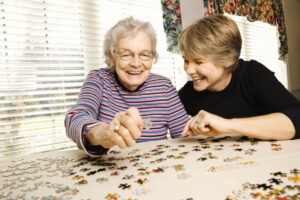For many, one of the hardest decisions they have to make in their life is to move a loved one into senior living. Taking responsibility for another person’s life experience is a tremendous job and can create pressure to find the best possible environment for your loved one. Discovering how to deal with guilt is part of that process.
Even when it is evident that a current caregiver cannot provide the level of care necessary for a loved one, it is still a tremendous change full of emotions when you do finally move a loved one into the care of others — sometimes the decision can even bring up emotions of failure or defeat. It is important to engage these emotions, process them, and create new coping methods. The beauty of feeling these emotions is it shows you care deeply for your loved one. While it is easy to beat yourself up, you only do that because you want the best for a beloved family member.
How To Deal With Guilt? Try to Remember the Big Picture
As with most things in life, you did not cause your loved one’s illness or decline — their need for consistent care. Even if you have been able to care for them until this point, all humans have limits in their ability to care for someone else.
Consider that your loved one will probably get more care in senior living simply because more people are available to serve their needs. Care really does work best in a team environment. Also, your loved one’s decline will happen with or without you. One of the best decisions you can make is to support them through the transition to an environment that can take care of them through all stages of eldercare.
There Will Be Uncertainty, and You Will Need Time to Adjust
As with any large life decision, there will be moments of uncertainty. Did I pick the right facility? Are they doing everything I did to take care of the person I love? Is my loved one happy? These questions are valid and will take time to process as you adjust to a new living situation.
I would encourage you to consider you are doing the best you can right now. You might end up needing to adjust a few things in the first few months. Allow time to begin to create new rhythms for you and your loved one and work out all of the small details to get to a safe, stable daily routine.
Consider other times in your life you have encountered large changes — it can take a while to feel really stable in the new direction. One outlet might be to ask other residents’ family members how they coped with the change. How long did it take? Were there specific things that helped them process the guilt?
Interact with Your Loved One in New Ways
Transitioning a loved one to a senior living community might actually free you up to engage in new ways. Instead of basic physical care, driving a loved one to doctor’s appointments, making meals, or grocery shopping for your family member, you now have the opportunity to take that same amount of time and create new memories. Consider your time together as opportunities for meaningful conversations or simply enjoying each other’s company instead of “doing” for your loved one.
Join them for an activity at their new residence — perhaps you can dance, paint, or walk outside together. You can embrace these relational moments because there are now professionals who take on the responsibility and worry around their physical care. As a result, you don’t have to worry about falls, low blood sugar levels, or physical illness.
You now have a team of professionals ready to jump at a moment’s notice. This move can actually free you up for the most important engagement during this season of your loved one’s life — emotional support and creating memories together facilitated by the senior living staff.
Look for Support for Yourself
Many family members need to seek support groups or individual counseling after moving their loved ones into a senior living home. There can be so many reasons you feel guilty, and it can be incredibly beneficial to hear others’ perspectives as they might share the same reason for their feelings of guilt. Knowing you’re not alone in this process can be one of the best ways to maneuver through your emotions.
This is also a time for you to re-engage with hobbies, friendships, or activities that you enjoy. The happiness you experience in these things can help you continue to process the emotions of sadness, grief, and guilt. In fact, if you have a deep support system, it can give you the energy to visit your loved one often, to continue to advocate for the best care, and to get creative with ways that you can do small things to brighten their day.
Partner with Your Loved One’s Senior Living Community
Your role as a caregiver does not end when your loved one enters senior living. In fact, you need to consider yourself as a member of their care team; you continue to be their greatest advocate.
Now that you are a part of a team, you are less likely to experience caregiver burnout and can really offer the best of yourself to your loved one in care and the rest of your important relationships. Truly, this can be a healthy, happy situation for both you and your loved one, and in time, that can help you learn how to deal with guilt and ease the worries you might feel.
At Elder Care Alliance, we work to support you and your loved one’s experience of transitioning into a senior living community. We offer family support groups and education as you continue to navigate your loved one’s care. We know it can be a difficult life change, and we are here to walk your family through it.




















